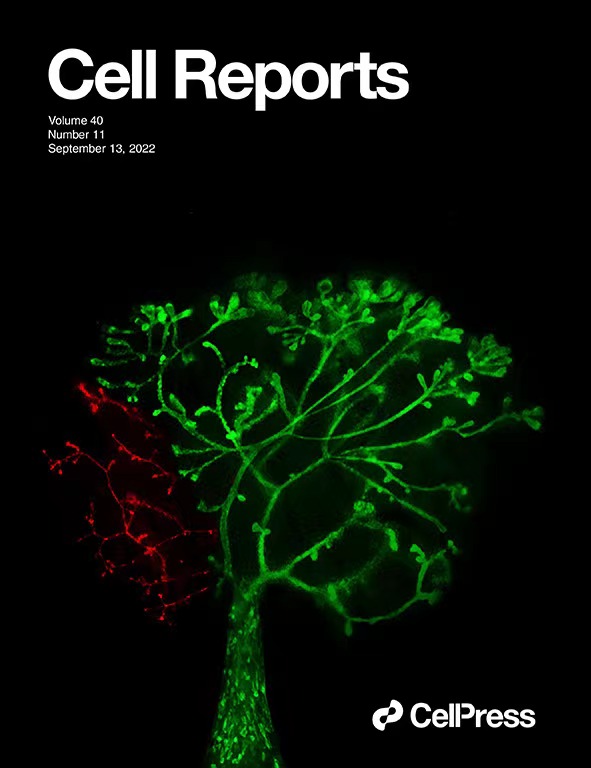On Sep 13 2022, a research team led by Prof. CAl Cheguo, Medical Research Institute and Frontier Science Center for lmmunology and Metabolism of Wuhan University, just made progress in mammary stem cell (MaSC) and triple negative breast cancer (TNBC) research.
Their work, “CDK14 inhibition reduces mammary stem cell activity and suppresses triple negative breast cancer progression”, published in Cell Reports as cover article, uncovered a mechanism that regulates MaSC activity, and provides a promising target for TNBC therapy. As shown below,the cover image(Figure 1) depicts the mammary duct tree regenerated in vivo by MaSCs. Zhang et al. show that the control MaSCs can regenerate the complete mammary duct tree (green), while the CDK14 knockdown MaSCs lose the competitive regeneration advantage, and only a few ducts were observed (red).

Figure 1 Cover image of Cell Reports Volume 40, Issue 11
Wnt/β-catenin signaling pathway has become a key signaling pathway regulating mammary organogenesis and oncogenesis. However, the therapeutic methods by targeting Wnt pathway against breast cancer have been limited. To address this challenge, they investigate the function of cyclin-dependent kinase 14 (CDK14), a member of Wnt signaling pathway, in mammary development and breast cancer progression. They show that CDK14 is expressed in mammary basal layer and elevated in TNBC. CDK14 knockdown reduces colony formation ability and regeneration capacity of mammary basal cells, and inhibits the progression of murine MMTV-Wnt-1 basal-like mammary tumor. CDK14 knockdown or pharmacological inhibition by FMF-04-159-2 suppresses the progression and metastasis of TNBC. Mechanistically, CDK14 inhibition suppresses mammary regeneration and TNBC progression by attenuating Wnt/β-catenin signaling (Figure 2). These findings highlight the significance of CDK14 in mammary development and TNBC progression, shedding light on CDK14 as a promising therapeutic target for TNBC.

Figure 2 The mechanism of CDK14 in regulating mammary stem cell activity and triple negative breast cancer progression
Prof. Cheguo Cai is the corresponding author of this paper, and graduate students Mengna Zhang and Lingxian Zhang are the co-first authors. This research was supported by Prof. Yi Arial Zeng from Shanghai Institute of Biochemistry and Cell Biology of Chinese Academy of Sciences and Dr. Jinpeng Li from Zhongnan Hospital of Wuhan University. This work was supported by the National Natural Science Foundation of China and the Ministry of Science and Technology of China.
Full text link:https://www.cell.com/cell-reports/fulltext/S2211-1247(22)01159-7
